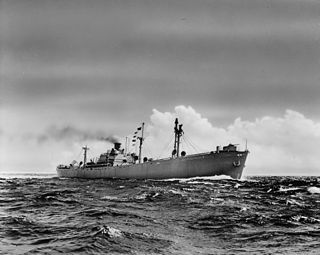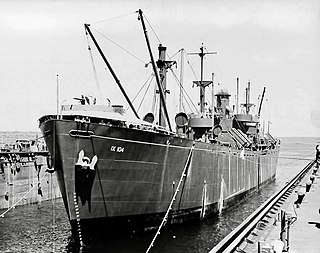
USS Childs (DD-241/AVP-14/AVD-1) was a Clemson-class destroyer in service with the United States Navy from 1920 to 1945. She was scrapped in 1946.
SS Mission Santa Barbara was a Type T2-SE-A2 tanker built for the United States Maritime Commission during World War II. After the war she was acquired by the United States Navy as USS Mission Santa Barbara (AO-131). Later the tanker transferred to the Military Sea Transportation Service as USNS Mission Santa Barbara (T-AO-131). She was a Mission Buenaventura-class oiler and was named for Mission Santa Barbara in Santa Barbara, California.

SS William A. Graham was a Liberty ship built by the North Carolina Shipbuilding Company of Wilmington, North Carolina, and launched on 26 July 1942. One of over 2,700 cargo ships produced during an emergency shipbuilding program, William A. Graham was named for William Alexander Graham, a 19th-century governor of North Carolina and a U.S. Secretary of the Navy.

USS Mizar (AF-12) was the United Fruit Company fruit, mail and passenger liner Quirigua that served as a United States Navy Mizar-class stores ship in World War II.

USS Merak (AF-21), the second Navy ship of the name, was the United Fruit Company cargo and passenger liner Veragua that served as a United States Navy Mizar-class stores ship in World War II.

Evan Thomas, Radcliffe and Company was one of the more prosperous and better-known of Cardiff-based shipowning companies, established in 1882 by a Ceredigion sea captain, Evan Thomas, and a Merthyr Tydfil businessman, Henry Radcliffe. Until 1939 one of the main trades of the company was to carry Welsh steam coal, which reached its peak in the years immediately before World War I. The company was ceased trading in the 1980s.

SS Zebulon Vance was a Liberty ship built in the United States during World War II. She was named after Zebulon Vance, the two time Governor of North Carolina, lawyer, and Confederate Army officer.
SS Nathanael Greene was a Liberty ship built in the United States during World War II. She was named after Nathanael Greene, Continental Army general famous for his service in the Southern theater of the American Revolutionary War. She was operated by the United States Lines under charter with the Maritime Commission and War Shipping Administration.

SS Virginia Dare was a Liberty ship built in the United States during World War II. She was named after Virginia Dare, the first English child born in America, who disappeared along with the rest of the Roanoke Colony.
SS John Wright Stanly was a Liberty ship built in the United States during World War II. She was originally named after John Wright Stanly, a New Bern, North Carolina businessman and American Revolutionary War privateer. On the ways she was renamed SS Leiv Eiriksson after the Norse explorer.
SS Betty Zane was a Liberty ship built in the United States during World War II. She was named after Betty Zane, a frontier heroine of the American Revolutionary War and ancestor of author Zane Grey.
SS Joseph Hewes was a Liberty ship built in the United States during World War II. She was named after Joseph Hewes, Secretary of the Naval Affairs in the 2nd Continental Congress and signer of the Declaration of Independence for North Carolina.
SS Richard Caswell was a Liberty ship built in the United States during World War II. She was named after Richard Caswell, the first Governor of North Carolina, member of the Continental Congress, militia officer in the War of the Regulation and the American Revolutionary War. She was operated by the South Atlantic Steamship Company under charter with the Maritime Commission and War Shipping Administration.
SS James J. Pettigrew was a Liberty ship built in the United States during World War II. She was named after J. Johnston Pettigrew, a Confederate general from North Carolina killed during the American Civil War.

SS Alexander Lillington was a Liberty ship built in the United States during World War II. She was named after Alexander Lillington, a North Carolina Patriot militia officer who served at the Battle of Moore's Creek Bridge and the Battle of Camden.
SS Waigstill Avery was a Liberty ship built in the United States during World War II. She was named after Waightstill Avery, the first Attorney General of North Carolina who fought a duel with Andrew Jackson in 1788.
SS John Owen was a Liberty ship built in the United States during World War II. She was named after John Owen, Governor of North Carolina from 1828 to 1830.
SS Robert Y. Hayne was a Liberty ship built in the United States during World War II. She was named after Robert Y. Hayne, an American lawyer, planter and politician. He served in the United States Senate from 1823 to 1832, as Governor of South Carolina 1832–1834, and as Mayor of Charleston, South Carolina 1836–1837.

SS Peter H. Burnett was an American Liberty ship built in 1942 for service in World War II. She was later acquired by the United States Navy and renamed USS P.H. Burnett (IX-104). Her namesake was Peter Hardeman Burnett, an American Governor from 1849 to 1851.

A. H. Bull Steamship Company was a shipping company and passenger liner service founded in New York City in 1902 by Archibald H. Bull (1848-1920). Service started with shipping between New York and Florida. His fleet of ships then added service to other Eastcoast ports. The company is also often called the Bull Lines and the Bull Steamship Line or A. H. Bull & Company. While founded in New York, Bull soon move its headquarter to Peir 5 in Baltimore, Maryland. Bull Lines main Eastcoast ports were: Baltimore, Charleston, Philadelphia, Tampa and Norfolk, Virginia. Oversea ports: Porto Rico, Antwerp, Bordeaux, Hamburg, Bremen, Copenhagen, and West Africa. Bull Steamship Line supported the US war effort for both World War I and World War II, including the loss of ships.









